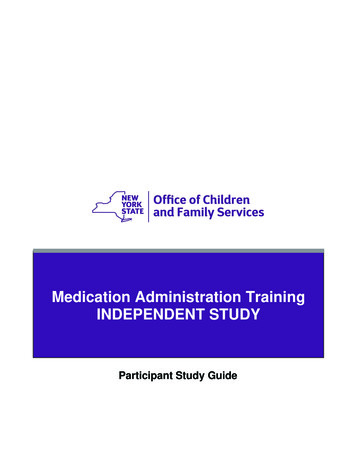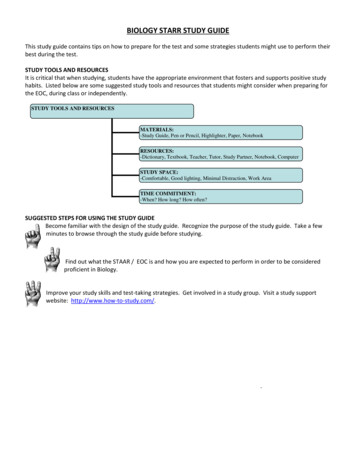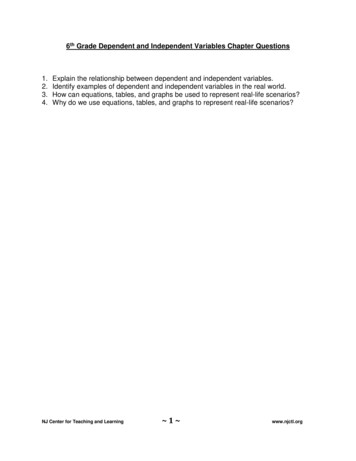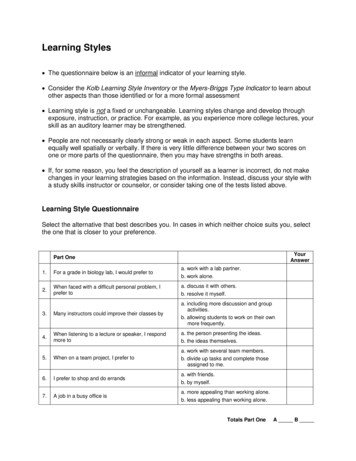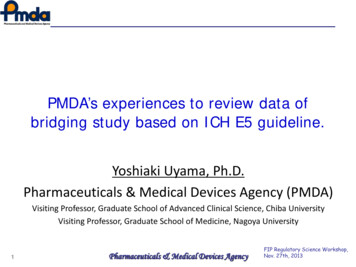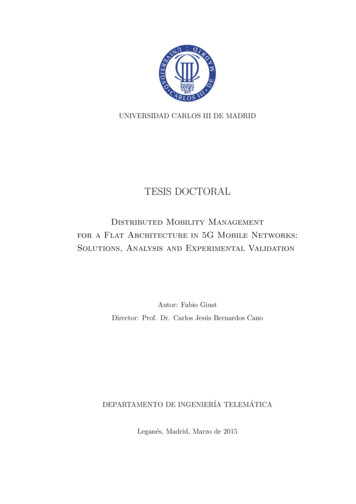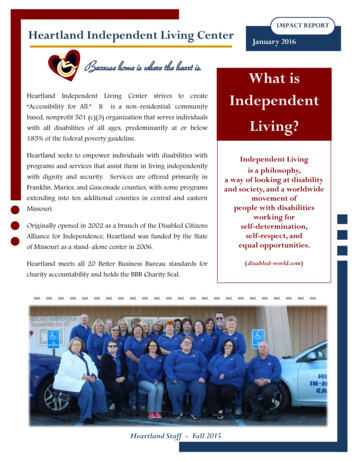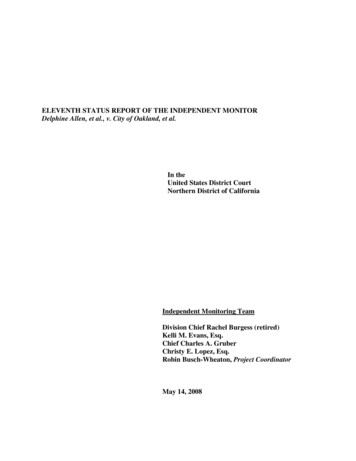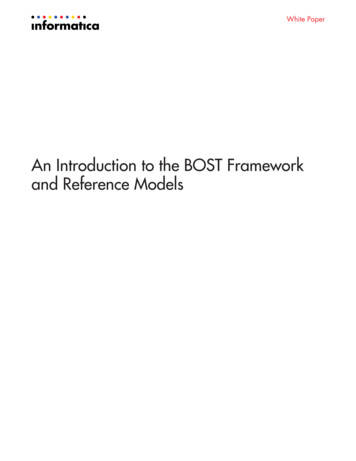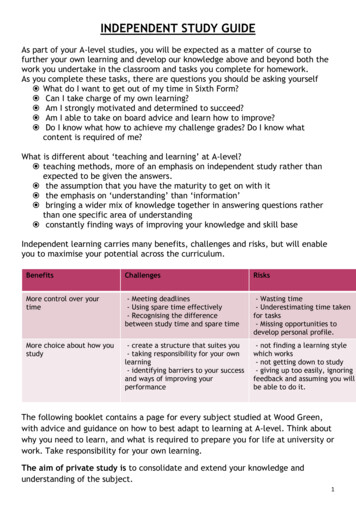
Transcription
INDEPENDENT STUDY GUIDEAs part of your A-level studies, you will be expected as a matter of course tofurther your own learning and develop our knowledge above and beyond both thework you undertake in the classroom and tasks you complete for homework.As you complete these tasks, there are questions you should be asking yourself What do I want to get out of my time in Sixth Form? Can I take charge of my own learning? Am I strongly motivated and determined to succeed? Am I able to take on board advice and learn how to improve? Do I know what how to achieve my challenge grades? Do I know whatcontent is required of me?What is different about ‘teaching and learning’ at A-level? teaching methods, more of an emphasis on independent study rather thanexpected to be given the answers. the assumption that you have the maturity to get on with it the emphasis on ‘understanding’ than ‘information’ bringing a wider mix of knowledge together in answering questions ratherthan one specific area of understanding constantly finding ways of improving your knowledge and skill baseIndependent learning carries many benefits, challenges and risks, but will enableyou to maximise your potential across the curriculum.BenefitsChallengesRisksMore control over yourtime- Meeting deadlines- Using spare time effectively- Recognising the differencebetween study time and spare time- Wasting time- Underestimating time takenfor tasks- Missing opportunities todevelop personal profile.More choice about how youstudy- create a structure that suites you- taking responsibility for your ownlearning- identifying barriers to your successand ways of improving yourperformance- not finding a learning stylewhich works- not getting down to study- giving up too easily, ignoringfeedback and assuming you willbe able to do it.The following booklet contains a page for every subject studied at Wood Green,with advice and guidance on how to best adapt to learning at A-level. Think aboutwhy you need to learn, and what is required to prepare you for life at university orwork. Take responsibility for your own learning.The aim of private study is to consolidate and extend your knowledge andunderstanding of the subject.1
AS/A2 Art and DesignCourse: Edexcel Fine Art (9FA0)The specification, past papers, exemplar work and mark schemes are availableon the Edexcel website.Additional Reading:Robert Hughes – ‘The Shock of the New’Matthew Collings – ‘This is Modern Art’A Useful purchase‘The 20th Century Art Book’ Phiadon ISBN: 0714838500Very Useful WebsitesArt2dayTateSaatchiNational portrait GalleryMuseum of Modern ArtPast courseworkIs available for you to look through in the Art department.If you miss an Art lesson Find out if any homework has been set. Go overmissed work with a peer or arrange a time to meet with a member of staff inclinic.Study PeriodsPlease feel free to use the Art rooms to continue working – This will be essential2
BiologyCourse: OCR Biologywww.ocr.org.ukThe specification, past papers and mark schemes are available on OCR’s el-gce-biologyCourse text books:Biology 1, ISBN:978-1-471809-15-6Biology 2, ISBN:978-0521732994Additional Reading:“Biology A”, author: SueHocking, ISBN: 978-1447990-79-6“A Level Biology for OCR”,author: Ann Fullick, ISBN:978-0-19-835191-7“Biology” author: Campbell,ISBN: 978-0-8053-1880-7Check out the school library for other useful textbooks and reading booksRecommended revision guides:AS / A2 Biology for OCR, CGP, ISBN:A Level Revision for OCR ISBN: 978-0-198351-93-1Other Revision ideas:Homework and useful links are emailed out to your school email.Use the Summary Specifications. Read through the biological drawing andmathematical skills required by the exam board.Check out: Shared area – science – biology for the exemplified specification forBiology AS and A2. Use resources to produce summary maps and revision cards.3
Additional Reading:Nature journal: www.nature.com/New Scientist magazine: www.newscientist.com/Focus magazine: http://sciencefocus.com/Key Skills to practise during study time Check out the practical skills guide on OCR website. This is essential readingprior to carrying out the coursework tasks Practise breaking down long answer questions into chunks. Learn definitions, make flash/cue card resources to help your revision Use the text book questions at the end of each section, including the“examination” questions at the end of each topic section Try past paper exam questions to develop exam technique Go back over home works and test. Check the work and make corrections.Complete your homework feedback form Build mind/concept maps to link ideas across topics Use your school email and check regularly for work and information fromyour teachersIf you miss a Biology lesson, the lesson Power Point will be emailed to your schoolaccount. Go over missed work with a peer or arrange a time to meet with amember of staff in clinic.Folder OrganisationWe expect you to do the following: Have 1 folder per subject. Use dividers to separate topics and teacher notes. At the start of each topic, you should have the homework feedback sheetAND the personalised learning checklist for that topic. Use and review theseregularly. Keep your work in a good, logical order, so that you can find any work asnecessary. Keep your personal learning checklist up to date.4
BUSINESS STUDIESThe aim of private study is:to consolidate and extend your knowledge and understanding ofthe subject.Some suggested tasks:Read through the chapter or chapters in the textbook which relate to each part ofthe syllabus being covered. Take notes on the most important aspects.Make sure that you fully understand the key terms and concepts, perhaps by testingyourself or a partner on their precise meaning.Go into the Library and look at some of the books on Business Studies; the stock ofbooks is updated each year. Each book offers a slightly different perspective on thesubject and it is much better if you get into the habit of using a number of differentbooks rather than relying on one textbook.Get into the habit of reading a quality newspaper each day and looking out forstories and/or articles which deal with the most important social and businessevents. The Library will have recent copies of newspapers.Read the Business Review Magazines held in the Library. They contain interestingand up to date articles based on real companies and they usually have examples ofanswers to examination questions.Use the Internet - there are many sites devoted to Business Studies. EgBus Standing Assignments (Web view)Bus Online Resources Websites (Web view)www.tutor2u.net/www.thetimes100.co.ukUse BBC iplayer or Channel 4 – 4oD watch relevant TV programs or teacherrecommended programs such as Panorama, Dispatches, etc.Sign up to Blogs . Jim Riley & Graham Prior (via Tutor2u) orwww.scoopit/pinnwick or Twitter.@bizattheboxThe OCR web site has many past papers mark schemes and examiners reports, gothrough these answering each of the questions. Every examination paper is differentbut it will not hurt if you practise answering previous questions; it will give you avery good idea of the kind of questions you can expect to see in your examination.The answers don’t need to be detailed; they could be in the form of bullet pointsand brief notes. ess-studiesh030-h430/5
ChemistryCourse: Edexcel Chemistry www.edexcel.comThe specification, past papers and mark schemes are available on Edexcel’s 20sample%20assessments/AS Chemistry 2015 Specification.pdfCourse text books:Edexcel A Level ChemistryStudent Book 1Authors: Graham Hill, Andrew Hunt,Graham CurtisISBN: 9781471807466Edexcel A Level ChemistryStudent Book 2Authors: Graham Hill, Andrew Hunt,Graham CurtisAdditional Reading: students who usethese books would be advised to checkthe syllabus often so as to not miss noruse incorrect content.AS Edexcel (2008)Author: George FacerISBN: 978-0-340-95760-8A2 Edexcel (2009)Author: George FacerISBN: 978-0-340-95761-5Edexcel Chemistry for A2Authors: Graham Hill and Andrew HuntISBN: 978 0340 959305ISBN: 978-1471807497Edexcel Chemistry for ASAuthors: Graham Hill and Andrew HuntISBN: 978 0340 94908 5Books in the library for extrareading:A level Chemistry (1994)Author: E. N. RamsdenAS Edexcel (2008)Author: George FacerISBN: 978-0-340-95760-8A2 Edexcel (2009)Author: George FacerISBN: 978-0-340-95761-5AS and A level chemistry (2000)Author: Eric LewisRevision guides:CGP AS-Level Chemistry Exam Board EdexcelThe revision guideISBN: 978 1 84762 124 5Phillip Allan Updates also do a range of EdexcelChemistry Revision books, as well as work books.(One per module)NB. Any revision guide for Edexcel syllabus 2015is also appropriate6
Good web addresses to ge13/page13a.htmMagazines that may interest you:Hodder Education Phillip Alan Magazine- from the linkhttp://www.hoddereducation.co.uk/magazinesNew Scientist Magazine- from the link http://subscription.newscientist.comKey Skills to practise during study time: Homework will be emailed home and will therefore need to be printed off and done forthe lesson it is due in.Keep your notes up to date by visiting the lesson Power Points your teachers use (eitherthrough email or the shared area)Respond to all marking feedback by doing correctionsWrite notes on each practical activity carried out in class and make sure the observationsseen (e.g. colour changes) or steps you take (e.g. heated filtration or re-crystallisation)are part of your general knowledge.Revise all mechanisms, reagents and conditions in organic chemistry topicsMake revision resources such as notes, card sorts for key words, summary cards orconcept maps.Answer questions from textbooks (or chapter by chapter questions that are available onthe shared area) to add to your notes and ask your teacher to check them with you.Bring your textbook, data booklet and folder to each lesson so you can refer to them if youneed to!If you miss a Chemistry lesson, tell the teacher beforehand if possible, work will be emailed toyour school account; copies of all power points will also be emailed to your school account.found. Check your email for any homework that has been set. Go over missed work with a peeror arrange a time to meet with a member of staff in clinic. If you have not received the emails,make sure you contact your teacher to remind them.Folder OrganisationWe expect you to do the following: Have 1 folder per subject (e.g. Chemistry separate to the other Sciences or Geography) Use dividers to separate topics and teacher notes. File your notes at the end of every lesson – put homework back in the appropriate placewith the question sheet and feedback answers close by for reference. Keep your work in a good, logical order, so that you can find any work as necessary. Attend clinic after school on a Tuesday in S7.7
Product DesignResources for further independent study can be found in the library, engineeringand design magazines, and on the internet.Design Styles Arts and CraftsArt NouveauPost-ModernismBauhausMackintoshArt DecoReading on the basic principles / rules / methods / practicesResearch specific designers in each style and examples of their productsAwareness of products on the marketAnalyse the development of materials, technologies and production methods Search videos on You Tube Look at products in your own home – disassemble and put back together(with permission!) www.technologystudent.com8
DramaYear 12 Research the theories and techniques of Antonin Artaud, Bertolt Brecht,Constantine Stanislavski, Steven Berkoff and Joan Littlewood. Read some of Brecht’s works to better understand his style for example:Mother Courage and Her Children, The Caucasian Chalk Circle or TheThreepenny Opera. Look and research different styles of g Watch YouTube videos for practical examples of devised performances. Look at Guardian Theatre Reviews that will aid your review after the e/theatre tone/reviews Research and watch YouTube clips of the following contemporary theatrecompanies; Kneehigh http://www.kneehigh.co.uk/, Frantic Assemblyhttp://www.franticassembly.co.uk/, hp, Punch Drunkhttp://punchdrunk.com/ .Year 13 Research in more detail practitioners and their varying dramatic techniquesand styles; Augusto Boal, Jerzy Grotowski, Berkoff, Edward Gordon Craig,Max-Stafford Clark, Peter Brook. Investigate various styles of theatre, practitioners and companies e.gKneehigh http://www.kneehigh.co.uk/, Frantic Assemblyhttp://www.franticassembly.co.uk/, hp, Punch Drunkhttp://punchdrunk.com/ . Read Lysistrata and annotate your script in detail. Research lighting and costume terminology and techniques. Research the time period your interpretation of Lysistrata is taking place in. Research the original performance conditions of Greek Theatre and makenotes on your script. Research and make notes on Shakespeare’s original performance conditions. Research the theatres of the 16th century.9
English Literature Yr 12 and 13: New Linear A LevelSpecification and specimen nd-a-level/english-literature-b-7716-7717You should be reading the periodical in the library called English Review regularly.Paper 1– Literary Genres TragedyWe will be reading William Shakespeare’s Othello (Yr 12) Arthur Miller’s Death of a Salesman (Yr 12) Thomas Hardy’s Tess of the D’Urbervilles (Yr 13)So read:About tragedy - f-history-oftragedy/ and ragedyPoetics Aristotle (available online er Shakespearean Tragedies – King Lear, Macbeth, Romeo and Juliet (read or watchthem – live is best, but there are excellent film versions of many of the tragedies)Other examples of tragedy:A Streetcar Named Desire Tennessee WilliamsJude the Obscure Thomas HardyA view from a Bridge Arthur MillerVarious poems by Thomas HardyWuthering Heights Emily Brontewww.PoemHunter.com gives you access to a wide range of poems and poetsPaper 2– Texts and Genres: Elements of Political and Social ProtestWe will be reading the following Khaled Hosseini’s The Kite Runner (Yr 12) William Blake’s Songs of Innocence and Experience (Yr 12) Margaret Atwood’s The Handmaid’s Tale (Yr 13)This paper will also include an unseen extract from another text. You will need torespond to it in terms of it being a piece of political or social protest writing so reading awide range of texts with these aspects in mind is crucial. The web links below have anoverview of some relevant ideas.https://en.wikipedia.org/wiki/Social novelhttps://en.wikipedia.org/wiki/Political fiction10
You could also read: Ian McEwan’s Atonement, Charlotte Bronte’s Jane Eyre or Stephen Chbosky’s ThePerks of being a Wallflower for other examples of bildungsroman Margaret Atwood’s Oryx and Crake, George Orwell’s 1984, or Aldous Huxley’sBrave New World for other examples of dystopia William Wordsworth’s Lyrical Ballads, Samuel Taylor Coleridge’s The Rime of theAncient Mariner or Blake’s The Marriage of Heaven and Hell (1790) for otherexamples of Romantic Poetry.To support your understanding of any of the set texts:- York Notes Advanced are very helpful- http://www.sparknotes.com/- No Fear Shakespeare - http://nfs.sparknotes.com- http://www.cliffsnotes.com/- www.shmoop.com – a massive range of excellent notes and help with a range oftexts. Notes on Roman and Greek Mythology, biblical characters and othercontextual features, as well as specific support with texts on the course in termsof character, theme, synopsis etc.NEA: Theory and IndependenceIn Year 12, you will begin to prepare for independent coursework. You will read the AQAcritical anthology and apply your chosen approaches to texts of your choice – one ofwhich must be poetry. See the reading list at the end of this booklet for suggestedreading – read widely from this list to support your studies. You should also do furtherreading about the critical approaches that you choose to pursue.The literary critical theories studied are: ry CanonNarrativeYou should aim to consider how these theories might produce different readings of thetexts we have studied, and also any wider reading you might do, as well as specificallyfor the coursework.11
English Language and Literature Yr 12 and 13New Linear A-LevelSpecification and specimen papers: el/english-language-and-literature-7706-7707You will be studying:Paper 1-Telling StoriesFrankenstein by Mary Shelley Year 12A selection of poetry by Robert Browning Year 12An anthology of non-fiction texts, including speech, about Paris. Year 12Paper 2 - Exploring ConflictThe Kite Runner by Khaled Hosseini Year 13Othello by William Shakespeare Year 13NEA Non Examination Assessment - Making ConnectionsAt the end of Y12 you will begin the preparation for the Non Exam Assessment(NEA). This is an exciting opportunity to carry out your own investigation onlanguage use in different types of text. It is called 'Making Connections' becauseyou will make active connections between a literary text and some non-literarymaterial. The connections must be based either on a chosen theme or on the ideathat particular linguistic strategies and features may occur in the different typesof material.You will be given extensive guidance on what to read and focus on and you willalso be expected to read literary and linguistic analysis as well as the base texts.Suggestions for this independent investigation include: A comparison of openings in a novel and an autobiography.An exploration of real and fictional events.Representations of particular themes in literary and non-literary sources.What is a character? An exploration of the idea of character in literatureand in other texts.How does storytelling work in different modes?An exploration of the use of non-literary genres within literary texts.An exploration of speech features in literature and in real-worldcommunication.12
You should ensure you read widely from the reading list you have been given andwhich is available at the end of this guide. Your reading should include novels,plays, poetry and journalism, speeches, transcripts and information texts.You should be reading the periodical in the library called English Review regularly.You should also be reading a range of newspapers regularly – The Independent,The Guardian, The Telegraph and The Times are all available in the library. Readthe editorials and opinion pieces in particular.To develop your own written rammar/grammar tutorial/page 41.htmTo support understanding of the poetry and novel:- York Notes Advanced are very helpful- http://www.cliffsnotes.com/- www.shmoop.com – a massive range of excellent notes and help with arange of texts. Notes on Roman and Greek Mythology, biblical characters andother contextual features, as well as specific support with texts on thecourse in terms of character, theme, synopsis etc.Specification and past papers; Examiners’ 07/assessment-resourcesFRENCHWe follow the AQA syllabus evel/french-7652Grammar Explain each of the grammar points you have covered in class in your ownwords Go through your Elan grammar workbook and correct any exercises you gotwrong. Annotate your exercise by writing the reason why a question was13
wrong (eg je ne reçoit jamais de cadeaus – ending for je form is s and nounswith eau ending should end in X and not s)Ask your teacher for more grammar explanation if you feel you need morepracticeInvest in a grammar text book and refer to grammar online sites r each essay, make a list of your main errors. These should be referredto in subsequent essays and hopefully, you should not be making the sameerrors again .(you will probably be making different ones !!)For every verb you write in an essay, underline it in pencil. For everyadjective you write, circle. During the writing process, and at the end,double check your agreement/position and rub out. Laborious, but oh soworth it in the end!Word level Learn some standard essay phrases to introduce, argue and conclude. Invest in the A level vocab book ‘Mot à Mot ‘ and start learning at least 20words a week. After each lesson, note down all new words into a notebook/folder. Youmay even want to categorise them into topics. Learn these religiously! Start to widen your vocabulary repertoire in essays. Try not to use the sameword more than once and find alternatives for verbs/adjectives wherepossible eg. Je veux/je souhaite/ j’ai envie/je suis attiré parSpeaking For each topic covered, design your own spider gram to include all therelevant points and arguments. These should be basic bullet points. Talkthrough in French the points you have noted as if you were doing a minipresentation. Read longer articles aloud. Focus on certain sounds eg –tion –in – en- er The website www.languageguide.org/francais is useful for practisingpronunciation. Click on ‘Readings’ and listen to the transcripts. Visit the website www.text-to-speechimtranslater.net which enables you totype in a text and hear it pronounced correctly.Listening Visit the following websites :www.tv5monde.frwww.france24.frYou can review news items and watch videos.www.france2.frwww.curiosphere.fr - excellent video clips on lots of different topicswww.ina.fr – videos and adverts We have a French DVD library in N2 and there are also French films availableto loan from the Study Centre14
ReadingRecommended reading Le Petit Nicolas series – Rene GoscinnyLe Petit Prince – Antoine de Saint- ExuperyHarry Potter à l'école des sorcières (and others) - JK RowlingHygiène de l'assassin – A. NothumbBonjour la Tristesse – F SaganPietr-le-Letton – G. Simenon (introducing detective Maigret)Coule la Seine – F. Vargas ( three short mystery stories)L'Amant- M. DurasSac de Billes – J. JoffoIf you are interested in poetry, and would like to explore a few Frenchpoems, go to www.french.about.com . You can also listen to a commentaryon the analysis of the poemGERMANGrammar Explain each of the grammar points you have covered in class in your ownwords Go through your Zeitgeist grammar workbook and correct any exercises yougot wrong. Annotate your exercise by writing the reason why a question waswrong (eg er bekomme , Geschenk )15
Ask your teacher for more grammar explanation if you feel you need morepractice Invest in a grammar book After each essay, make a list of your main errors. These should be referredto in subsequent essays and hopefully, you should not be making the sameerrors again .(you will probably be making different ones !!) For every verb you write in an essay, underline it in pencil. For everyadjective you write, circle. During the writing process , and at the end,double check your agreement/position and rub out. Laborious, but ohsooooo worth it in the end !Word level Learn some standard essay phrases to introduce, argue and conclude. Invest in the A level vocab book and start learning at least 20 words a week After each lesson, note down all new words into a notebook/folder. Youmay even want to categorise them into topics. Learn these religiously ! Start to widen your vocabulary repertoire in essays. Try not to use the sameword more than once and find alternatives for verbs/adjectives wherepossible eg. Meiner Meinung nach/Ich bin der Meinung/Ich denke/glaube/Ich bin der Ansicht.Speaking For each topic covered, design your own spider gram to include all therelevant points and arguments. These should be basic bullet points. Talkthrough in French the points you have noted as if you were doing a minipresentation. Read longer articles aloud. Record your own voice on your MP3 player andplay it back Visit the website www.text-to-speechimtranslater.net which enables you totype in a text and hear it pronounced correctly.Listening Visit the following website :www.swr3.de - German ‘Live’ radioGeneral16
We follow the OCR syllabus : -french-h075-h475/For the preparation of your speaking topic, you could visit these sites to give youextra reference material :www.spiegel.dewww.juma.dewww.yahoo.de17
GeographyGeography at Wood Green School is from the Edexcel exam board. Hopefully bynow you are very familiar using past papers and mark schemes in lesions andthrough revision to check your progress and to improve your exam technique.Get familiar with the content of the exam board website to see what informationthey share with you.Try thisDownload past papers from the beginning of your course. Cutand paste exam questions into similar topic headings so that youcan use these to test your progress and to make sure your notes areclear and can be used to answer questions.The units for AS are Dynamic Landscapes and Dynamic Places.Consolidating the learning:Powerpoints and resources from the lesson are usually copied across into a sharedaccessible space for students. This might be a storage area in the cloud for2016/17! Watch this space! Students should look over the powerpoint from thelesson to consolidate what took place in the lesson following the note makingapproach set out by Mr Armstrong in his study skills lessons. 3 useful questions tohelp do this are 1) what activities did we do in the lesson? 2) What did I learn? 3)What sticks in mind (Stickability – this could be anything!)18
EBooksThe Geography Department will provide you with one of the core textbooks forthe course written by Chief Examiners. We also have a second e book within theschool system. This can be found in ‘All Programmes’ ‘Humanities’ ‘Geography Active Teach’. You should look to use this to compare notes takenfrom the core textbook and the resources that we might provide. This E book alsohas exam questions built into it.GCSE e books can still be a useful resource for AS level. These can also be foundin the Humanities folder and can be used to create revision notes on areas nottackled by your teacher (for example processes of erosion!)Additional Research:From time to time, you will be asked to complete some further research. This willadd depth to your knowledge and will enable you to draw comparisons. Youshould know that Geography is everywhere and should also know that we like toexplain, analyse and interpret trends and patterns that are occurring all of thetime. Up to date facts and figures are therefore part of the geography curriculumand examiners like you to use relevant examples of geography within the news.Try thisStart up a Delicious account https://delicious.com/Regularly look at BBC, other news sites and newspaper sitesand tag and bookmark what you are reading for future use Geography Reviews and Library resourcesThe library currently stocks the Geography Review for students to read. There isalso a New Internationalist and New Scientist that from time to time haveexcellent articles that support the course you will study. You can subscribe toGeography Review for less than 20 and you will receive 4 magazines a year.Please speak to your geography teacher if you wish to do this.Geofiles and GeofactsheetsThese are case study specific journal articles written by experts for AS and A2Students. They are well worth a look and will always provide useful facts andfigures for top end answers.19
HistoryUseful websiteswww.spartacus.schoolnet.co.uk This is like an encyclopaedia and you can searchsections on different countries, different people ar-ks5.htm ains/g4/. The National Archiveshas a good section on the Cold War, and on Stalin.Specification: s/edexcel-alevels/history-2015.htmlOnline broadcastshttp://www.thehistoryfaculty.org contains a variety of podcasts which can beused to supplement work in school.Podcasted history of Russia and the USSR (2010) from the Historical Association:www.history.org.uk/resources/secondary resource 4209 124.html‘Meet the Historians’ ml (episodes 1 and 3)CNN Cold War documentary (for Year 13)http://www.youtube.com/watch?v 5aIRMcySCjU&list PL43E372ED7CF28785Russia documentary (for Year 12):http://www.youtube.com/watch?v Me7vZ1qes8k on the revolution itselfhttp://www.youtube.com/watch?v zUPOIsYMRSM on LeninBBC news reports:Berlin: Soviet Blockade (1948): www.bbc.co.uk/archive/berlinwall/8231.shtmlBerlin Refugee Stories (1953): www.bbc.co.uk/archive/berlinwall/8203.shtmlLife in Berlin before the wall Radio 4 programme ‘In our time’ is available on podcasts. Programmes for currentAS and A2 available are: ‘Tsar Alexander II’s assassination’; ‘The East IndiaCompany’; ‘The Indian Mutiny’; ‘The Mughal Empire’; ‘Lenin’.Additional Reading (available in the school or in public libraries)History Review is available in the library – there are many
CGP AS-Level Chemistry Exam Board Edexcel The revision guide ISBN: 978 1 84762 124 5 Phillip Allan Updates also do a range of Edexcel Chemistry Revision books, as well as work books. (One per module) NB. Any revision guide for Edexcel syllabus 2015 is also appropriate
